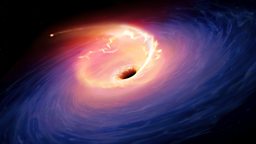Exploring the Symphonic Universe, with Prof. Brian Cox

"I think there is only one interesting existential question: What does it mean to live a small, finite life in a possibly infinite, eternal Universe?"
Britain's favourite stargazer, Prof Brian Cox, addresses this question in The Symphonic Universe, a concert of music by Sibelius, Ives and Mahler with the Βι¶ΉΤΌΕΔ Symphony Orchestra conducted by Dalia Stasevska.
Here, Brian explains why The Symphonic Universe is part of his personal search for answers.
Our small world orbits around one star amongst four hundred billion inside one galaxy amongst two thousand billion in the small patch of the Universe we can see. Light takes over a hundred thousand years to cross our galaxy, and two billion years to make its way from our nearest galactic neighbour, Andromeda. We are a fragile spec in a limitless ocean of stars.
The questions raised by our observations of the Universe are profound; to put it bluntly, when confronted by the size and scale of the Universe, what’s the point?
The Symphonic Universe is part of my personal search for answers. I don’t claim to have THE answer of course. As one of my heroes Carl Sagan wrote, astronomy is a humbling and character-building experience; anyone who claims to have THE answer is not humble and is also wrong. Having said that, the search for answers is in itself an important part of what it means to be human. Astronomy doesn’t render the quest for meaning futile; it amplifies the challenge.
Nature is undoubtedly both beautiful and terrifying, but then so are our lives. Insight into the meaning of both can only be gained by exploration, and there are many ways to explore. The central idea behind The Symphonic Universe is that music and science are two of the ways we explore; both are necessary, neither alone is sufficient. We won’t find meaning through the lens of a telescope, but neither will we find meaning if we avert our eyes from Nature and, through fear or lack of curiosity, refuse to contemplate the Universe beyond.
Sibelius: Symphony No.5

Sibelius: Symphony No 5 (third movement, arr. Iain Farrington) (excpt)
With the Βι¶ΉΤΌΕΔ Symphony Orchestra conducted by Dalia Stasevska.
Sibelius’s 5th symphony is a love letter to Nature, depicting the majesty of swans in flight. For me, it is also a love letter to humanity; we are, after all, a part of Nature – in fact we are the most complex part of Nature we know of anywhere in the Universe. A human being is a collection of atoms that contemplates atoms; matter, processed in generations of stars and clumped together by gravity, capable of writing symphonies.
If we do not survive there will be no love, no science, no art, no music.
Why should our future matter? My answer is it’s possible that Earth is the only planet in The Milky Way Galaxy that has ever hosted an intelligent civilisation. I will explain why I think this is possible, perhaps even likely. If it is true that we are alone, we are the only island of meaning in a sea of 400 billion stars. If we do not survive there will be no love, no science, no art, no music. There will be nobody to explore the Universe for millions of light years in every direction because nowhere else will life have made the journey from prehistory to thought. The galaxy of the future will be meaningless again, as it may have been for almost all of time.
Our fragility and isolation surely confer value. Whatever meaning is, it emerges from the human mind. Without minds, there are no thoughts, and without thoughts there is no meaning. Imagine the possibility that Earth is the only place in our galaxy where a single thought exists or has ever existed. That would make it hard to argue that we are insignificant.
There are questions beyond our value that arise when we begin to explore Nature, however; perennial questions of existence.
"Why do we exist?" is a question we can answer in broad sweep and quite remarkable detail. It is a story that begins 13.8 billion years ago at the Big Bang, continues through the births and deaths of countless stars and the formation of the Earth, and culminates in our rare world populated today by Darwin’s Endless Forms Most Beautiful, each and every one related to a common ancestor that emerged almost four billion years ago in the deep oceans of the primordial Earth. Ours is a majestic story.
"Why does anything exist at all?" is a different and far more difficult question, however, but perhaps we are beginning to glimpse answers.
Charles Ives: The Unanswered Question

Charles Ives: The Unanswered Question
With the Βι¶ΉΤΌΕΔ Symphony Orchestra conducted by Dalia Stasevska.
In The Unanswered Question, Charles Ives poses and explores the deepest possible question. Why does anything exist?
The answer to that question is of course “We don’t know”, but I am at least tempted to add a “yet”. From a scientific perspective, "Why" questions are usually dismissed as unanswerable, but it is worth exploring what an answer might look like. For example, our best explanation for the pattern of the galaxies scattered across the sky like snowflakes is that their origin can be traced back to a time before the Big Bang when the Universe was cold and dark and expanding at an unimaginably fast rate. The end of this period, known as Inflation, is the beginning of The Big Bang. We do not know how Inflation began, or even if it had a beginning in time. Perhaps our Universe is eternal. If our Universe didn’t have an origin in time, does that answer the Why question?
Remarkably, the frontier of theoretical physics is now largely concerned with questions about the nature of space and time themselves. What is Time? We have been forced into asking this question by trying to understand Black Holes.

Black Holes are regions of space, bounded by a so-called Event Horizon, from within which nothing can escape, according to Einstein’s Theory of General Relativity. When viewed from outside, the Event Horizon is the end of space. When inside, the singularity at the core is the end of time. They are formed by the collapse of massive stars, and we have photographs of them. They exist! And yet they raise profound questions about the nature of reality itself.
In my view, we are indescribably valuable; rare and remarkable natural structures composed of atoms as old as time. Meaning is located within us, and it is our responsibility to protect it.
In trying to understand them, theoretical physicists have concluded that space and time themselves are not fundamental properties of our Universe. Remarkably, it appears that the information that encodes our existence is more fundamental than the physical reality we perceive. Even more remarkably, we have recently understood how the information is encoded, and it appears very similar to the scheme we apply when we build quantum computers. Reality as a quantum computing code? Perhaps. If we acquire this knowledge, as Stephen Hawking wrote, we would surely know the mind of God. What are we to make of these discoveries motivated by our attempts to understand the stars?
Here is my answer
If there are very few places in the Universe where atoms have come together to contemplate the existence of atoms, then Earth, notwithstanding its physical insignificance, is an extremely valuable world.
I have often used the word “meaning”. Meaning does not sound like a scientific concept, but it self-evidently exists because the Universe means something to each of us. If meaning is a property which emerges from rare collections of atoms on a very few worlds and for a short amount of time, then it is local and temporary. If this is correct, and we destroy ourselves through ignorance, inaction or a deliberate act of self-destruction, then we may also destroy all meaning in a galaxy of four hundred billion Suns, perhaps forever.
Maybe we will discover that the Universe is infinite in extent. Maybe we will discover that there are an infinite number of Universes. But if the laws of nature can be different in those Universes, then life may not be possible across large swathes of the Multiverse. Entire Universes may be meaningless too.
We are far more fragile and valuable than any of us can comprehend. Our world views, our politics, the way we behave in our personal lives and as citizens may matter not only beyond the horizons marked out by our respective towns, cities and countries, but also beyond the shores of our planet. Maybe even beyond the shores of our galaxy. Our lives are short; the lifetime of our civilisation is finite; but these precious moments in cosmic time bring meaning to an otherwise meaningless Universe. In my view, we are indescribably valuable; rare and remarkable natural structures composed of atoms as old as time. Meaning is located within us, and it is our responsibility to protect it.
The most eloquent expressions I know of the realisations that our lives are small, delicate and finite and yet indescribably valuable, perhaps even in a Universal context, are the symphonies of Mahler. The Orchestra can say things in music that I cannot in words, and so I leave the last word to the Orchestra.
Mahler: Adagio (Symphony No 10)

Mahler: Adagio, from Symphony No 10 (arr. Castelletti) (excpt)
With the Βι¶ΉΤΌΕΔ Symphony Orchestra conducted by Dalia Stasevska.
-
![]()
The Symphonic Universe
Professor Brian Cox and the Βι¶ΉΤΌΕΔ Symphony Orchestra carry us across the universe: music by Sibelius, Ives and Mahler with the Βι¶ΉΤΌΕΔ SO's principal guest conductor, Dalia Stasevska. Hannah French presents this programme as part of Βι¶ΉΤΌΕΔ Radio 3’s Light in the Darkness season, with commentary from Cox.

